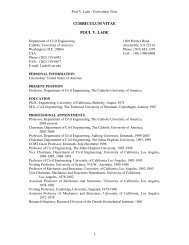Nota Bene-- C:\ARTICLES\TERMIN~1.NB Job 1 - the Catholic ...
Nota Bene-- C:\ARTICLES\TERMIN~1.NB Job 1 - the Catholic ...
Nota Bene-- C:\ARTICLES\TERMIN~1.NB Job 1 - the Catholic ...
Create successful ePaper yourself
Turn your PDF publications into a flip-book with our unique Google optimized e-Paper software.
faith. 2) It places <strong>the</strong> focus on <strong>the</strong> way of <strong>the</strong> Law as <strong>the</strong> problem in Israel’s failure to<br />
attain righteousness. Not that <strong>the</strong> Law in itself is <strong>the</strong> problem, but <strong>the</strong> Law poisoned by<br />
<strong>the</strong> power of sin (7:7-12). Israel “did not arrive at <strong>the</strong> (righteousness that is <strong>the</strong> object of<br />
<strong>the</strong>) Law” because from <strong>the</strong> works of <strong>the</strong> Law no human being is made righteous before<br />
God, for through <strong>the</strong> Law comes consciousness of sin (3:20). That Israel did not arrive<br />
at <strong>the</strong> Law (νο' µον, 9:31) in <strong>the</strong>ir pursuit of righteousness is thus already preparing for<br />
Paul’s statement that what God has done in Christ is <strong>the</strong> termination of <strong>the</strong> Law (νο' µου,<br />
10:4) as <strong>the</strong> way to righteousness, so that righteousness is now available for all who<br />
believe ra<strong>the</strong>r than try in vain to do <strong>the</strong> works of <strong>the</strong> Law. 9<br />
In his diatribal style Paul continues with an elliptical statement: “Why? Because<br />
not from faith but as if from works” (9:32a). From <strong>the</strong> context <strong>the</strong> ellipsis is to be filled in<br />
as follows: “Why? Because (Israel sought to attain righteousness) not from faith (in<br />
Christ) but as if (righteousness could be attained) from (doing <strong>the</strong>) works (of <strong>the</strong> Law).”<br />
Righteousness ra<strong>the</strong>r than <strong>the</strong> Law is <strong>the</strong> implied topic here because righteousness is<br />
<strong>the</strong> main <strong>the</strong>me and ultimate object of <strong>the</strong> pursuit/non-pursuit in 9:30-31. 10 Israel failed<br />
to attain righteousness because <strong>the</strong>y did not pursue it from faith but pursued it as if <strong>the</strong>y<br />
could attain it by doing <strong>the</strong> works of <strong>the</strong> Law.<br />
In 9:32a Paul is not saying that Israel failed to arrive at <strong>the</strong> Law of righteousness<br />
because <strong>the</strong>y tried to fulfill that Law from works ra<strong>the</strong>r than from faith. 11 Nowhere in<br />
Romans does Paul talk about fulfilling <strong>the</strong> Law from faith; ra<strong>the</strong>r, faith is always in<br />
contrast to doing <strong>the</strong> works of <strong>the</strong> Law. 12 This is most evident in 3:27-28: “What <strong>the</strong>n<br />
becomes of boasting? It is excluded! Through what ‘Law’ (νο' µου)? (The Law) of<br />
works? No, but through <strong>the</strong> ‘Law’ of faith (νο' µου πι'στεως). For we maintain that a<br />
person is made righteous by faith without works of Law.” The “Law of faith” clearly does<br />
not refer to doing <strong>the</strong> Mosaic Law from faith. The word “Law” (νο' µος) here, without<br />
losing its reference to <strong>the</strong> Torah, is used with <strong>the</strong> connotation of “principle,” “system,” or<br />
“dispensation” to contrast it with <strong>the</strong> Mosaic Law as a system of doing works. 13 The<br />
4
















